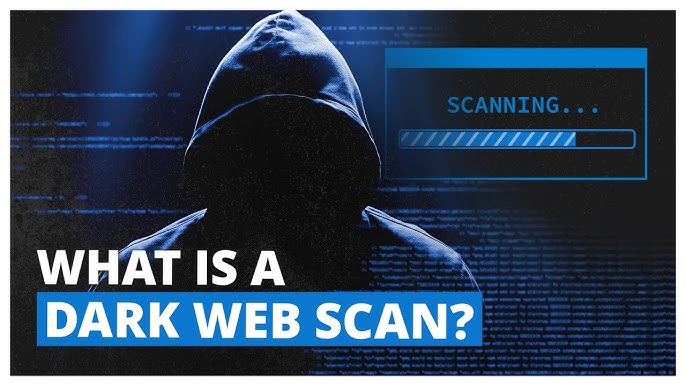The dark web is a collective name for a variety of websites and marketplaces that bring together individuals willing to engage in illicit or shady activities. They cannot be accessed through traditional browsers and are not indexed by search engines like Google. A large part of the dark web trades in stolen information, including personal data harvested from data breaches or with the help of infostealers and other cybercrimes. This can have major repercussions not only for the average user, but businesses and even whole countries, with stolen personal and perhaps financial information on dark web sites. This threat is real, which is why dark web scans can be an important part of protecting the identities of regular internet users.
Can My Information End Up on the Dark Web?
Before asking, “What is a dark web scan?”, it is worth questioning if and how personal information can make its way onto the dark web. The simple answer is that all internet users are at risk of having their details released to the web’s murkier side, even if they do not access it themselves. This is because anyone can fall victim to phishing or malware attacks, through which hackers can compile data such as passwords, identities and credit card information. In some cases, hackers may steal this data from the companies that collect and store personal information for advertising and marketing. In either case, after gathering all this information, hackers make it available to others on the dark web.
What is Dark Web Scanning?
Simply put, a dark web scan enables internet users to discover whether their personal information has been made available on the dark web. These digital tools scour the darknet—specifically, through lists taken from known data breaches—to see if a user’s data has been uploaded. If the tool uncovers any user information on the dark web, it alerts the user, giving them the opportunity to take appropriate remedial steps.
Although they can be useful in helping to protect personal data and user privacy, it is important to note that dark web scanners can only do so much. This is because no matter how powerful the dark web scan tool is, it is impossible for any scanner to check every part of the darknet since many websites on this side of the internet remain private and inaccessible. As such, it is important for internet users to remain vigilant about their data online, for example, by using VPNs and antivirus software and maintaining good habits around sharing information on the web.
Dark web scans are also capable of identifying different types of criminal activity, which the darknet is notorious for. As such, some security organizations or law enforcement agencies may use dark web scanners to assist with investigations, using them to scour the dark web for mentions of illegal drugs, weapons and counterfeit products, for example.
Also Read: How Digital Forensics Can Decrypt WhatsApp Messages
How Does a Dark Web Scan Work?
In the simplest terms, dark web scan tools are software that use specially crafted algorithms to trawl the dark web for mentions of a user’s personal data. Generally, to run a scan, the user must first enter specific personal details. The software will then run these details against the data dumps—known lists of personal details stolen through data breaches—that are available on the darknet. A dark web scan can search for all sorts of sensitive user information, including:
- Names
- Email addresses
- Passwords
- Unencrypted chat transcripts
- IP addresses
- Credit card or bank account information
- Social media accounts
- Identity details (such as passports, social security, or ID cards)
If the scan does discover a user’s personal details on the darknet, it immediately alerts them to what has been found and where. It then becomes incumbent on the user to take the appropriate next steps to protect themselves, as previously outlined.
However, users need to remember that a single dark web scan usually limits itself to popular marketplaces that have fewer privacy protocols and cannot search the entire dark web. Nor can they account for any breaches that occur immediately after the scan. As such, users who are very concerned about their privacy could opt to run regular dark web scans with different tools or use dark web monitoring to constantly parse the dark web for their stolen information.
Why Are Dark Web Scans Important?
The average internet user does not deal with the darknet, so why would they have any interest in performing a dark web scan? The answer is simple: to protect their personal data and try to prevent cybercriminals from using these details to perpetrate crimes. The obvious issues might include hacking into emails and social media accounts or stealing money from bank accounts. But there are numerous types of more nefarious frauds and scams that can be executed with the right personal information, such as identity theft, credit card fraud, financial fraud and robocall scams.
Pros of Dark Web Scanning
The main function of dark web scanning is for users to know whether their personal data has been stolen and potentially made available to cybercriminals. If this is the case, then the user can take certain measures to try and protect themselves from further problems. For example, they can block credit cards, alert banks and change passwords to avoid financial loss and identity theft. But there are several other reasons why some users—or indeed, companies—choose to make dark web scanners part of their routine online check-ups:
- Identify and Mitigate Data Breaches: By regularly performing a dark web scan, individuals are alerted if any sensitive information has appeared on the dark web and can take steps to avoid serious repercussions. This is particularly important to organizations, which could be severely impacted if client data or system login information is leaked. Timing is important in these situations, so regular scans can ensure that breaches are identified as soon as possible.
- Prevent Future Breaches: With dark web scans, users can identify what information was stolen and potentially how it was stolen. Understanding all of this can be useful in ensuring the same mistakes are not repeated and therefore helps protect themselves from future leaks.
- Treat Client Data Responsibly: Organizations may not always know if their systems have been hacked, so routine dark web scanning is one way to ensure that they treat client data with care. These scans will identify breaches as soon as possible so that mitigating steps can be taken and clients can be notified.
Disadvantages of Dark Web Scanning
While dark web scans are useful, there are of course some considerations to take into account when planning to use dark web scanners:
- Scans are not 100% Foolproof: Despite how comprehensive some dark web scan tools are, they cannot possibly scan the whole darknet or guarantee that your information will always be found and protected.
- Scans Only Capture a Moment in Time: Each dark web scan only captures a particular part of the dark web at the time the scan is run and cannot account for any breaches that might occur immediately afterward. As such, users only receive a snapshot of what information is available online at the time of the scan.
- Costs: While some dark scanners are free, many others charge for their services. This could become expensive for individuals or small businesses who want to run regular checks.
- Timing: Unfortunately, by the time a dark web email scan identifies a problem, the user’s data may have already been breached. However, once one learns their data have been leaked, they can change passwords or apply other recommended security measures to mitigate related risks.
- Lack of Problem-Solving: Although dark web scans can identify stolen personal data, they cannot remove it. As such, users will then have to take steps to try and erase it from the darknet and put mitigation measures in place.
Also Read: Role of Digital Forensics in Cyber Crime Investigations
What to Do if a Scan Detects Your Personal Data
Cybercriminals use increasingly sophisticated methods to entrap internet users and lure them into sharing sensitive information. As such, it is entirely possible that passwords, credit card information and other data end up on the dark web. However, if a dark web scanner identifies stolen information, here are a few immediate actions to take to try and mitigate the damage:
- Change Breached Passwords: If passwords have been stolen, immediately change them on the associated accounts. It is also good practice to use multi-factor authentication and a password manager to protect accounts in case of a breach.
- Cancel Credit Cards: For breaches of credit card information, check recent transactions for any suspicious activity and quickly alert the provider to block transactions and cancel the stolen card.
- Alert Banks: Where bank account details have appeared on the dark web, check statements for any suspicious activity and immediately speak to the associated bank to have the account frozen and all transactions blocked.
- Review Permissions: Always review what permissions are authorized on social media accounts and any apps being used. It is generally good practice to use the most basic permission settings possible so that most stored information—including contact details, photos, locations and more—is not accessible by these accounts.
- Limit Information Sharing: It is usually a good strategy to share as little information as possible online, especially on websites or with companies that are not well-known.
How to Avoid Having Personal Details Leaked
If the best offense is a good defense, then avoiding a data leak requires maintaining protective habits while using the internet. While there are always vulnerabilities, putting the following measures into place while online can help avoid personal data showing up on a dark web scan:
- Use a Password Manager: Generate strong passwords and store them securely. Regularly change passwords, too.
- Activate Multi-Factor Authentication: Enable this feature on all online accounts and apps where possible.
- Avoid Using Free or Public Wi-Fi Networks: These are often insecure and can be a breeding ground for data theft.
- Subscribe to a Powerful VPN Service: Use a VPN whenever possible, especially when dealing with sensitive information like bank accounts and credit cards.
- Stay Alert for Potential Phishing Attacks: Be cautious of suspicious emails and links.
- Check Website Security: Always verify that a website is secure and official before providing any personal information.
- Use Antivirus Software: This can help protect against many online threats.
Top Dark Web Scanning Tools
Here are some of the top dark web scanning tools available for individuals and corporations:
For Individuals:
- Identity Guard: This tool offers dark web monitoring, alerts users if their data appears on the dark web and provides recommendations for enhancing security.
- Experian Dark Web Scan: Provides monitoring of personal information on the dark web and alerts users if their data is found.
- LifeLock: Offers dark web monitoring as part of its identity theft protection services, alerting users if their information is discovered.
- SpyCloud: Focuses on helping individuals regain control of their accounts by monitoring compromised credentials.
For Corporates:
- Tenable.io: Offers a comprehensive dark web scanning solution that helps organizations monitor for exposed credentials and compromised data.
- Recorded Future: Provides threat intelligence that includes dark web monitoring to help organizations understand risks and protect their assets.
- DarkOwl: Specializes in dark web data and provides organizations with insights into risks associated with their data exposure.
- CyberInt: Offers a complete dark web intelligence solution for businesses, providing alerts and insights into compromised data.
Google’s Dark Web Scanning Feature
Google has introduced a feature that scans for personal information linked to Google accounts on the dark web. This feature is available through Google’s Security Checkup and alerts users if their information is detected. It helps individuals manage their online security proactively by providing insights into potential exposure and recommendations for strengthening their account security.




